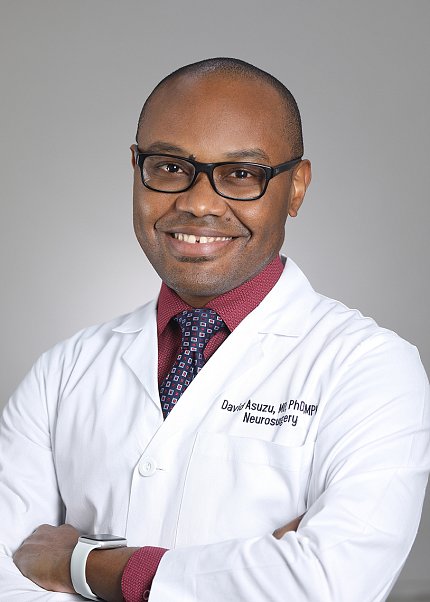NINDS’s Asuzu Awarded Neurosurgeon-Scientist Training Grant

The Society of Neurological Surgeons (SNS) recently awarded a Neurosurgeon-Scientist Training Program grant to Dr. David Asuzu, a neurosurgery resident in the NIH Neurological Surgery Residency Training Program.
The program was launched earlier this year to expand the pool of neurosurgery residents conducting research and to support them in becoming independent neurosurgeon-scientists.
“I am really honored to be included in the inaugural group of this new award program,” Asuzu said. “The selection committee spoke very highly of NIH as a center of excellence both in terms of available research facilities and of faculty mentoring and collaboration among research groups.”
Asuzu earned his bachelor of science degree in mechanical engineering from Iowa State University and his master of public health degree from Harvard School of Public Health.
In 2011, he earned his Ph.D. in physiology and biomedical engineering at the Mayo Clinic, and in 2017, his M.D. at Yale School of Medicine. He first came to NIH in 2016 as a visiting medical student and was accepted to the NIH Neurosurgery Residency Program in 2018.
Asuzu is part of Dr. Prashant Chittiboina’s research team in NINDS’s neurosurgery unit for pituitary and inheritable diseases. The group focuses on understanding the root cause of Cushing’s disease, which is caused when a small tumor in the pituitary gland makes excess ACTH hormone.
“Our research uses new molecular biology techniques to probe the genetics and epigenetics of tumor cells causing Cushing’s disease, with the hope of discovering new treatments for the disease,” Asuzu said.
The NSTP grant will allow Asuzu to supervise an independent research project while still working with Chittiboina. The award also includes formal mentoring from established investigators.
“As a young investigator, this is a tremendous opportunity. It will provide hands-on leadership training which will be invaluable when I run my own research group in the future,” Asuzu said. “In addition, the grant will help me finish ongoing projects and generate preliminary data for future early-stage research grant applications.”
SNS is the oldest neurosurgical professional society in the world. The primary goal of the residency training program is to improve human health by providing participants with the skills, mentorship, education and experience needed to successfully compete for individual research funding.—Shannon E. Garnett
